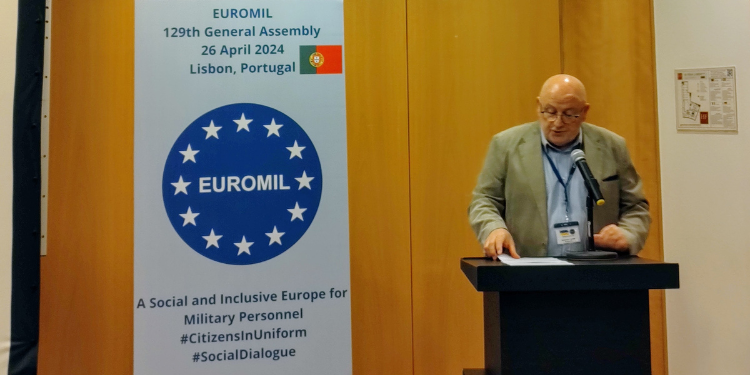EUROMIL holds its 129th General Assembly meeting
On 26 April, EUROMIL held its 129th General Assembly meeting in Lisbon (Portugal) hosted by our members associations ANS, AOFA and AP.
EUROMIL President, Mr Emmanuel Jacob opened the conference by welcoming the members and underlining the importance of the 50th anniversary of the Carnation Revolution, a significant event in Portugal’s history, and acknowledging the crucial role played by military personnel in it. In this context, the President underlined the need for synchronised rights and protections for service members across Europe, especially considering the challenges faced by military personnel in the current security environment.
Furthermore, Mr Jacob underlined the importance of the EU’s Strategic Compass and the Rapid Deployment Capacity, with discussions that should not only focus on industrial capabilities but also on the men and women serving in the military, ensuring equal opportunities, addressing challenges faced by women in the military, and promoting diversity and inclusion.
The General Assembly also adopted unanimously a declaration on Ukraine. Since the beginning of the war in Ukraine, EUROMIL declared its unwavering support to Ukraine. In cooperation with UUMS, EUROMIL discussed about its participation in some projects. In the occasion of ETUC Declaration for Ukraine, the General Assembly decided to echoes ETUC’s objectives and focus on the Ukrainian military personnel. EUROMIL’s Declaration stressed that the Ukrainian servicemen and women should be considered as citizens in uniform. The military personnel and the veterans should be part of the Ukraine’s reconstruction for a peaceful and prosperous future.
A dedicated panel discussion on social dialogue took place during the General Assembly. Jörg Tagger, Head of the Social Dialogue unit at the European Commission, emphasised the role of social dialogue in the European context, talking about its developments and functioning. Mr Tagger presented the existing sectoral committees and their role and the active steps taken to strengthen social dialogue, such as the Council Recommendation and the Commission Communication. Furthermore, he emphasized the importance of keep using the European Pillar of Social Rights and its Action plan as a compass, especially in light of the upcoming European elections.
Nadja Salson from EPSU presented her organisation’s work as a recognised social partner. Ms Salson reiterated the importance of collective bargaining at both national and European levels and presented the prerequisites and the legal framework for EU Social Dialogue. She emphasised how, recently, attempts have been made for a sectoral agreement on telework and the right to disconnect.
Following this introduction, Ms Salson addressed the challenges and opportunities within the defence sector. She mentioned the difficulties in engaging with public administrations and the need for social dialogue committees on all levels. Regrettably, Governments often state that the discussion is one for the Ministries of Defence. Despite this, there’s the need to keep pushing to fight for soldiers’ rights.
The general assembly meeting continued throughout the order of business, most notably with the approval of full membership of two Italian associations, ITAMIL and SILF. The meeting continued with the presentation of the national reports of EUROMIL members. Overall, the members exchange views on issues of common concern, as personnel equipment, the application of the Working Time Directive (WTD) in the Armed Forces, and salaries.
The General Assembly also concluded an internal debate concerning EUROMIL’s role in a changed geopolitical environment that had inaugurated during EUROMIL’s 126th General Assembly in Berlin (Germany). The outcome of which is the adoption of a statement regarding the minimum standards/ benchmarking for military personnel.
The day’s events closed at 17.15 and members will meet again in Budapest (Hungary) in October 2024 for the 130th General Assembly meeting.
29 April 2024

